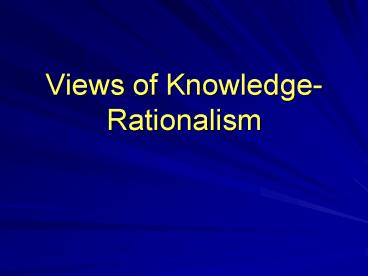Views of Knowledge-Rationalism - PowerPoint PPT Presentation
1 / 13
Title:
Views of Knowledge-Rationalism
Description:
... St. Augustine Rene Descartes Anne Conway Benedict Spinoza Gottfried Leibniz George Hegel Descartes: Doubt and Reason ... Eastern Philosophy ... – PowerPoint PPT presentation
Number of Views:78
Avg rating:3.0/5.0
Title: Views of Knowledge-Rationalism
1
Views of Knowledge-Rationalism
2
Rationalism
- Rationalism- The belief that reason, without the
aid of sensory perception, is capable of arriving
at some knowledge, or undeniable truths
3
Rationalisms Claims
- We do not rely on sensory experience for some of
the fundamental knowledge we have - Some of our knowledge depends solely on our
mental processes - Ex. Mathematicians use only a pencil, paper and
reason
4
A Priori Knowledge
- A priori knowledge- underlies our understanding
of the universe knowledge obtained
before/without the senses - All other knowledge depends on A priori
knowledge - Most rationalists agree that some knowledge is
obtained through the senses, but contend that
knowledge can also be acquired through reason
alone
5
Eastern Philosophy
- Shankara (788-822)
- Concept of sublation-the process of correcting
an error about reality when it is contradicted by
a different, more correct understanding of
reality - Mirages, dreams and hallucinations are corrected
by the senses - Ultimate reality is Brahman
6
Other Rationalists
- Plato
- St. Augustine
- Rene Descartes
- Anne Conway
- Benedict Spinoza
- Gottfried Leibniz
- George Hegel
7
Descartes Doubt and Reason
- Descartes experienced disillusionment because
of the turbulent times in which he lived - (Protestant Revolution, Church beliefs cast into
doubt, Copernicus Galileo challenged
religious/scientific truths
8
Descartes Doubt Reason
- He had trouble trusting anything and began to
systematically doubt everything - The only truth left was that he exists
- Descartes All genuine knowledge is derived
solely from reason without the aid of the senses - Descartes used reason alone to explain the
existence of God, the outer world, his own body
and other individuals
9
Descartes Distinctions
- We know what things are by intuition, or
perception of the mind, but our perceptions can
either be confused or clear and distinct - CLEAR know the nature/essence so well we can
identify it - DISTINCT can distinguish it from other things
10
Innate Ideas
- How does the mind arrive at knowledge without
using the senses? - Innate ideas-ideas present from birth
- Examples of innate ideas- basic principles of
logic, math science both propositions and
concepts
11
Propositions/Concepts
- Proposition
- The shortest distance between 2 points is a
straight line - Every event has a cause
- Nothing comes from nothing
- Concepts
- Point, line, straight
- All these cannot be observed, so they must come
from the mind!
12
Gottfried Leibniz (1646-1716)
- Leibniz-the mind at birth has inclinations,
tendencies to form ideas- as people mature, these
tendencies turn into fully formed ideas
13
Objections to Rationalism
- How can we have knowledge in our minds if we are
not aware of it? - Isnt to know something to believe it?
- How can we believe something without being aware
of it?































